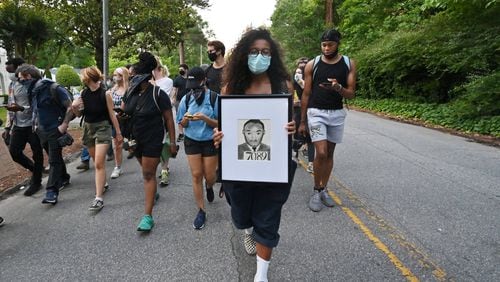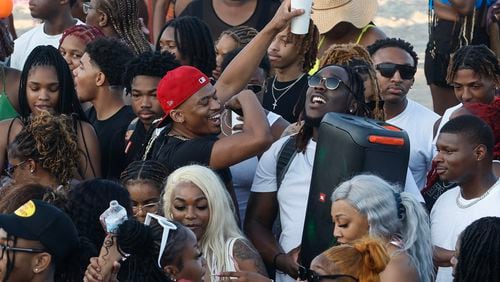The Rev. Timothy McDonald III on Sunday voiced his frustration at what he called the “silence of the white church.”
McDonald, senior pastor of First Iconium Baptist Church on Moreland Avenue in Atlanta, said he’s been disappointed that more white pastors haven’t spoken out about the killings of African Americans by white police officers, the coronavirus pandemic that has disproportionately affected people of color, rising unemployment and the threat of many people losing health care.
“Somebody needs to call them out and there’s power in speaking truth,” he said.
On Pentecost Sunday — which marks the day when the Holy Spirit descended upon the Apostles — many faith leaders addressed the deaths of Ahmaud Arbery in the Brunswick area, Breonna Taylor in Louisville and George Floyd in Minneapolis, African Americans whose deaths have fueled anger about police and race relations.
They lashed out at systemic racism they said has torn the nation apart and called for greater community engagement.
Related: Complete coverage: Atlanta protests
In Atlanta and across the country, tens of thousands of people have taken to the streets to protest the deaths. While many started peacefully, they have turned violent with some in the crowds looting and burning buildings and vehicles.
On Monday, OneRace, a young adult Christian-based, multi-racial and multi-ethnic movement of racial reconciliation, plans to hold a press conference with about 100 faith leaders on Liberty Plaza in front of the Georgia State Capitol to address the current violence and protests . The goals are to condemn racial violence, reaffirm values around social justice and to issue a call to action and civic engagement.
“All of us are kind of troubled by events this past week and we are trying to channel that energy into some constructive action,” said Hazen Stevens a co-director of OneRace. The group is also planning a June 19 march to the state Capitol. The starting point is yet to be announced.
“We believe a united church heals a divided nation,” said Stevens.
Atlanta Archbishop Gregory J. Hartmayer issued a statement joining other Catholic bishops in condemning racism.
“I join them in calling on all those in positions of authority, police, elected officials and yes, even pastors, to struggle with this issue—to seek the conversion we need to do the hard work of pursuing true justice in our world.”
In DeKalb County members of New Birth Missionary Baptist Church, gathered in the church’s massive parking lot for its first drive-in service after weeks of holding online only services.
Senior Pastor Jamal Harrison Bryant called the service a parking lot protest and titled his sermon “I Wish a Nimrod Would.”
He criticized Minneapolis officials for not removing Officer Derek Chauvin, who was videotaped with his knee on Floyd’s neck for more than 8 minutes, before Floyd eventually died. Chauvin had previous complaints against him for excessive force before then, but had kept his job.
“The enemy has got to be careful,” Bryant said. “The stuff that he got away with doing in the past, he cannot do in the future.”
He criticized President Trump for referring to protesters as “thugs” but refused to call “out of control police officers the same.”
He criticized Gov. Brian Kemp for sending a message that business was more important than lives during a pandemic.
He also called out those who are looting and turning to violence; peaceful protests have accomplished more, he said.
“It is peaceful protests that got us the Voting Rights Act. It is peaceful protests that got us the Fair Housing Act. It is the peaceful marches that got us the Civil Rights Act. From protests we have a found a policy. From riots we have only found incarceration.”
Rabbi Shalom Lewis, rabbi emeritus, Congregation Etz Chaim in Marietta agreed saying the protests have shifted the focus from pursuing justice for the family of George Floyd and, instead,” is now turning off many people because of the criminal behavior that as co-opted the otherwise legitimate and peaceful protest.”
The Right Rev. Robert Wright, the archbishop of the Episcopal Diocese of Atlanta, issued a statement that said since the founding of the nation, “we have had a white supremacy problem.”
Wright said he fears for the lives and mental well-being of his “three black sons. Especially because we know that organized white supremacists and their sympathizers have infiltrated law enforcement and government at every level.”
He said he does not condone violence by police or protesters because it gives critics a means to diminish legitimate concerns, he said. “But I am, like so many, at my wits end. When we are killed like dogs in the street we are told to be patient and that justice will prevail, except justice in these instances, has been the exception and not the rule.”
He specifically mentioned Atlanta and said “we can do better than this in Atlanta … I pray that the blood of Ahmaud Arbery and George Floyd has not been spilled in vain.”
About the Author






